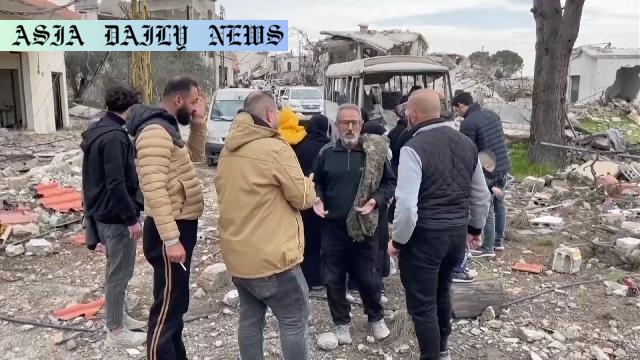Ceasefire: White House confirms extension of Israel-Hezbollah truce agreement until February 18, ensuring fragile peace persists.
The ceasefire agreement involving Israel and Hezbollah has been extended until February 18.
The US continues to oversee and broker the delicate agreement.
Concerns emerged due to delays in compliance from both sides, particularly Lebanon’s military deployment.

Introduction to the Ceasefire Agreement
The White House has confirmed that the ceasefire agreement between Israel and the Lebanese Shia Muslim group Hezbollah will remain in effect until February 18. This deal, initially implemented in November of the previous year, marks a pivotal effort to ensure stability in the region. Brokered and monitored by the United States, the agreement envisions a phased approach to achieving peace while addressing longstanding tensions.
Background and Objectives of the Agreement
The ceasefire was introduced as an essential measure to reduce hostilities and facilitate the withdrawal of Israeli and Hezbollah forces from southern Lebanon. As part of the agreement, Lebanon’s military is required to assume control of the region within 60 days of the deal’s initiation. The deployment of Lebanese forces aims to establish a neutral mediator capable of maintaining order and diffusing tensions in the area.
Challenges in Implementation
Despite the initial optimism surrounding the agreement, challenges arose when Israeli forces refused to vacate the region by the agreed-upon deadline, citing Lebanon’s failure to meet its obligations. Specifically, the lack of timely military deployment by Lebanon was highlighted as a significant concern. This standoff raised doubts about the durability of the truce, with observers fearing that the fragile peace could collapse without further intervention.
The Role of the United States
The United States has played a central role in brokering and supervising the ceasefire agreement. By serving as a neutral arbiter, the US seeks to prevent further escalation and encourage both sides to honor their commitments. This continued involvement underscores the geopolitical importance of stability in the region and the potential repercussions of any renewed conflict.
Broader Implications for Regional Stability
The agreement holds significant implications for peace in the Middle East. A de-escalation of hostilities between Israel and Hezbollah could pave the way for broader diplomatic engagement and enhanced cooperation on security issues. Conversely, a breakdown of the ceasefire could exacerbate regional tensions, further complicating efforts to resolve the ongoing conflict.
Looking Ahead: Prospects for Lasting Peace
As the February 18 extension approaches, all parties involved must take deliberate steps to fulfill their obligations under the agreement. Lebanon must expedite the deployment of its military forces, while Israel must demonstrate its commitment by withdrawing its troops. The international community will also need to maintain its focus on supporting the ceasefire and addressing underlying issues that fuel the conflict.
Conclusion
The extension of the ceasefire agreement until February 18 represents a crucial opportunity for both Israel and Hezbollah to reaffirm their dedication to peace and stability. With the continued oversight of the United States and a concerted effort from all stakeholders, this truce could serve as a stepping stone toward long-term resolution in the region.



Commentary
The Importance of Ceasefire Agreements
Ceasefire agreements such as the one between Israel and Hezbollah play a critical role in maintaining fragile peace and stability in conflict-prone regions. These agreements often serve as a foundation for further negotiations and provide a much-needed reprieve for the affected populations. In this case, the extension until February 18 underscores the importance of continued dialogue and mediation to prevent violence.
Challenges in Fulfilling Commitments
One of the primary challenges in implementing such agreements lies in ensuring compliance from all parties involved. Lebanon’s delay in deploying its military forces to the south reflects the complexities of enforcing agreements in areas fraught with political and logistical challenges. Similarly, Israel’s reluctance to withdraw highlights the deep-seated mistrust that often accompanies such truces.
The Role of External Actors
The United States’ involvement as a broker and supervisor illustrates the importance of a neutral third party in overseeing ceasefire agreements. External actors bring valuable resources and credibility to the negotiation process, helping to hold parties accountable and address potential disputes. However, the success of such agreements ultimately depends on the willingness of all stakeholders to abide by their commitments.
The Path to Lasting Peace
While the extension of the ceasefire agreement is a positive step, it is only the beginning of a long and arduous journey toward lasting peace. Both Israel and Hezbollah must work to build trust and address the root causes of their conflict. The international community should also remain engaged, providing support and encouragement for continued dialogue and cooperation.
Conclusion
The extension of the Israel-Hezbollah ceasefire agreement is a testament to the power of negotiation and the importance of sustained efforts to achieve peace. As February 18 approaches, all parties must prioritize fulfilling their obligations and working toward a brighter, more stable future for the region.